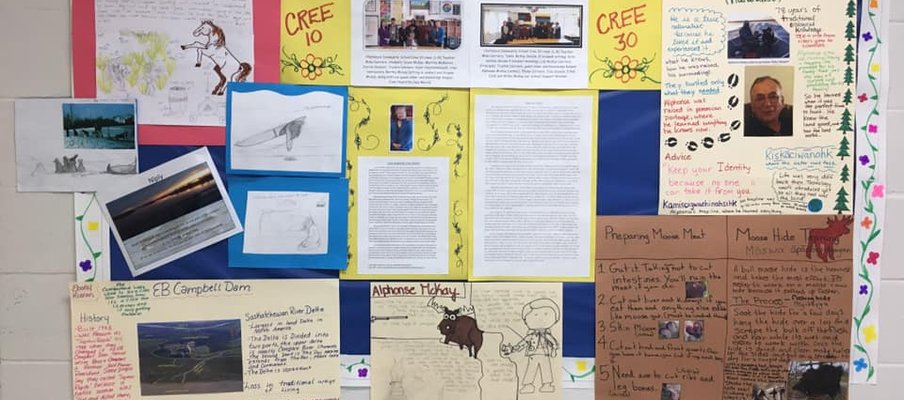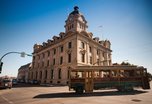Classroom Learning Experience Keep Indigenous Cultures and Traditions Alive

Related Programs

Held the past 37 years, the Cultural Week celebration in Cumberland House is known for engaging community members but even more for holding innovative initiatives that bring Indigenous history and culture into the classroom.
As part of this celebration, Mika Carriere, Cree language teacher at the Charlebois Community School in Cumberland House initiated the project “Learning from our Elders”, which involved bringing Elders into her classes – Grade 10 and Grade 12 Cree students - to share their life stories.
“As a school we are decolonizing the curriculum by using the Cree language in the classroom and by welcoming elders in to share their traditional ecological knowledge of the land and to reflect on the teachings of ‘mino-pimatisiwin’ – which is our school’s vision meaning ‘living the good life”, she says. “Our students are still in the process of learning their native language. We encourage and inspire our oskayak- young people- to keep the language alive by telling them ‘Kawina pagicīk’ (which means) don’t give up.”
The project involved two Elders – Elder Alphonse Mckay and Elder June Haybittle - and the students. They both grew up in the Cumberland House but had moved away from the community many years ago. Carriere says they were both visiting their families, and it was a blessing to have them visit the classroom and speak with the students about the past.
Carriere believes the youth need to listen to how challenging life was in the past because today they have so many amenities at hand, which are taken for granted. “We are teaching our students to take the time to truly listen not only with their ears but with their hearts. We believe that in order to know who you are, you need to know where you come from.”
Elder McKay shared a few stories of how Cumberland people lived in the past. “We used horses to haul firewood and water to the people that lived in the town of Cumberland,” he says. “You have to have the desire to learn the trade and everything. You have to know all difference signs of the species we are making a living of because you are living off of the land.”
Carriere goes on to say, “Life was simple back then; our Swampy Cree people did not see themselves as being poor but by being rich with the wealth of natural resources and family in their lives because they truly lived the mino-pimatisiwin (good life) way!” She adds that the “students were moved with emotion when Elder Alphonse McKay shared how much has changed over the past 40 years in regard to the landscape and the water levels; tears were shed when he reflected on how different life was like back then compared to now.”
The students created a visual display of all the lessons learned from both Elders. One of the art pieces submitted by one student, Ebony Carriere, was donated to a local women’s group who were advocating for the health of the Saskatchewan River Delta. The painting had a quote written on it, which was said by Alphonse McKay. He said in Cree, ‘Ekawina notina sῙpiy, kita –pimiciwan’, which means ‘Don’t force the river, it will flow on its own’. Carriere said this spoke to the importance of keeping the community’s water clean. “It’s a message from an elder who is telling us to leave things untouched, to let nature take its course.”
Carriere says with the community support and guidance, they would keep documenting the stories of the past, hoping that students can hear the voices of the Elders before it’s too late.
This project received funding from SaskCulture’s Community Cultural Engagement and Planning Grant. It also received the 2019 Lieutenant Governor of Saskatchewan Heritage Awards for engaging students and Elders in the community to documents and celebrate its unique living heritage.




